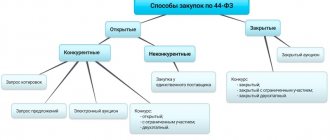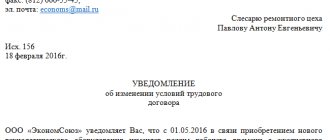Non-essential terms of the supply agreement
There is no definition in the law on the contract system, nor in civil law, of what constitutes non-essential terms of the contract .
If we take into account the norms of the Civil Code of Russia, then on the basis of them we can define such terms of the contract. These conditions represent certain parameters of a government contract that will not act as essential for this type of contract and do not require consent between the parties.
These conditions include other conditions under which an action due to inconsistency may not lead to the conclusion of a contract in the future. In most cases, these conditions are regulated by law; in addition, this rule can be used in a situation where the partners do not agree on other rules. These conditions include the following:
- date and place of conclusion of the contract;
- the form in which the contract can be concluded;
- jurisdiction of disputes that may arise from the contract itself.
Legal basis for making changes to a government contract
In Art. 95 44-FZ provides cases when changes to the essential terms of a government contract are allowed:
- when the price decreases without changing the supply volume;
- with a proportional change in the price and volume of goods, works or services by no more than 10%;
- when it is impossible to fulfill the terms of the contract under current conditions;
- with an increase in regulated tariffs that are important for a given purchase;
- with a decrease in funding for local purchases from the federal center;
- if, when purchasing treatment services for citizens of the Russian Federation abroad, the cost of such treatment has increased.
It is important to take into account that all changes to essential conditions are possible only by agreement of the parties, and the price change must be provided for in the procurement documentation. To change certain essential conditions of a government contract related to a decrease in procurement funding or the inability to fulfill the contract on the same terms, an order from the executive branch at the appropriate level is required.
The impossibility of the parties to fulfill the contract on current terms if disputes arise is determined by the arbitration court, taking into account the economic situation, technical equipment of the supplier, etc.
Change non-essential terms of the contract
The action to change these conditions represents an amendment to agreements concluded between the contractor and the customer and which will not affect the outcome of the contract.
In this situation, the supplier will have to send the customer a protocol of disagreements, which will indicate that amendments will be made to these terms of the contract. In addition, this document must indicate the circumstances of the changes being made.
When conducting electronic procurement, a mandatory requirement that must be met is sending a protocol of disagreements using the software and hardware of the ETP operator. We need help in obtaining accreditation for the ETP in order to be able to participate in trades and auctions in electronic form.
If the customer needs to make amendments to these conditions, then thanks to the ETP it will be possible to revoke the contract itself and make all the necessary amendments to it. Next, the participant will need to send the version of the contract that will be final.
Using the protocol of disagreements or the final agreement, it will be possible to find out the nature of the adjustments being made, that is, whether they are significant or not.
If changes are made to non-essential terms, it can still be concluded. When a protocol of disagreements is sent from the supplier, in this case the customer has the opportunity to make all the necessary amendments to the text of the contract itself and send the final version to the winner of the procurement procedure so that he can sign.
If amendments are required due to technical errors, then changes can be made when the agreement already contains the signatures of two parties and it is published on the EIS website.
But still, if the found defect is completely insignificant, then you can omit it and it would be better for the parties to sign the agreement in the form it is.
When the error is significant and can in any way affect the outcome of the contractual relationship or threatens the imposition of penalties, then the parties are recommended to prepare a protocol of disagreements and make all changes to it. Do you need help in obtaining a bank guarantee to ensure the fulfillment of obligations under a contract in accordance with Federal Law 44 and 223? Then contact our “Center” for help and we will help you resolve this issue.
Changing the terms of the draft contract
At the stage of concluding a government contract, changes in conditions occur in the following order:
- The customer forms a draft contract and places it in the Unified Information System.
- The winner of the purchase publishes a protocol of disagreements regarding the terms of the draft contract in the Unified Information System.
- Disagreements are reviewed by the contract service , and changes are made to the draft contract.
- The revised project is again placed in the Unified Information System , after which it is signed by the customer and the contractor, and the document comes into force.
The customer can change the terms of the future contract at the stage of drawing up the draft contract, which should be based mainly on the provisions of the procurement documentation. After publishing the draft contract in the Unified Information System, the procurement winner has 5 days to post a protocol of disagreements (Part 4 of Article 83.2 44-FZ), and when posting an electronic document, it must be signed with an enhanced electronic signature.
Typically, disagreements concern provisions of the draft contract that contradict the terms of the procurement documentation or the content of the customer's application. If the procurement winner’s objections are not related to the customer’s technical errors when drawing up the draft contract, but to an ambiguous interpretation of ambiguous points in the procurement documentation or the winner’s application, then the parties negotiate and eliminate the shortcomings.
If there is reason to believe that the unacceptable clauses of the draft contract are related to the customer’s attempt to change the terms of the purchase for his own benefit, then a copy of the protocol of disagreements should be sent to the local FAS body and the prosecutor’s office with a request to conduct an inspection.
The winner's objections will not be accepted by the contract service if they:
- relate to conditions set out correctly in accordance with the procurement documentation;
- require the addition of new conditions not contained in the winner’s documentation and application;
- contradict procurement legislation.
It is important to take into account that the rejection of the procurement winner’s objections to the draft contract does not give him the right to refuse to execute the contract, and if he evades signing without good reason, the procurement winner is added to the list of dishonest procurement participants.
If you disagree with the decision of the contract service to change the terms of the draft contract, the winner of the purchase should contact the local FAS body with a statement about the customer’s unlawful actions.
You can send the dispute protocol only once. Objections accepted by the customer are included in the final version of the contract, which is signed by the parties.
Login to the site
News from the website of the Publishing Group "Delo and Service"www.dis.ru
"Organizational HR Management"
21.03.06 — 29.03.06
New articles in the online library
“Non-essential” terms of the employment contract
Published in the magazine: Enterprise Personnel
The accuracy of the drafting of the text of the employment contract and its “quality” largely determine, in particular, how the relationship between the employee and the employer will develop in the future in the process of work, whether it will be easy or difficult to resolve possible labor disputes between them (an employment contract is one from the main documents containing evidence on the circumstances referred to by the parties during the dispute), whether the employer’s hands will be “tied” when preparing and making certain decisions affecting the interests of the employee.
Since the essential terms of the employment contract listed in Article 57 of the Labor Code of the Russian Federation must be contained in its text without fail, the employer’s “room for maneuver” in this part is, in general, small.
In contrast to the framework established by law when establishing the essential conditions of an employment contract, the inclusion of additional conditions in it is carried out by the employer (who, as a rule, prepares a draft employment contract), based on the characteristics of the organization’s activities and the official powers of persons performing certain functions to implement this activities, the HR policy established in the organization, the degree of interest of the employer in certain specialists, the material or financial resources available to the employer, etc.
The article by M.M. describes in detail what additional conditions it is advisable to fill out standard draft employment contracts with employees developed by employers. Pokrovskaya.
Continued >>>
https://www.dis.ru/kp/arhiv/2003/11/1.html
A good leader has no subordinates (Mary Parker Follett - management theorist)
Published in the magazine: Management in Russia and abroad
The author talks about the life and work of one of the most famous management theorists of the 20th century. Mary Parker Follett's ideas, expressed in her books, have often been used by other scientists and management researchers. Who is Mary Parker Follett and how has she earned the attention of those who strive to improve management systems in themselves and in their company?
Continued >>>
https://www.dis.ru/manag/arhiv/2003/6/5.html
Personnel of enterprise No. 3
Read more >>> https://www.dis.ru/kp/arhiv/2006/3/
Suggest topics, ask questions >>> https://www.dis.ru/cgi-bin/hrm/forum.cgi Topics currently being discussed:
|







